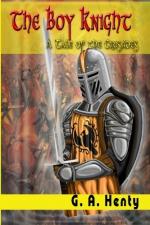He turned to a gorgeously dressed noble next to him, and said:
“Your brother, Ben Abin, is Governor of Jerusalem, and the gardens of the palace are fair. Take this youth to him as a present, and set him to work in his gardens. His life I have spared, in all else Ben Abin will be his master.”
Cuthbert heard without emotion the words which changed his fate from death to slavery. Many, he knew, who were captured in these wars were carried away as slaves to different parts of Asia, and it did not seem to him that the change was in any way a boon. However, life is dear, and it was but natural that a thought should leap into his heart that soon either the Crusaders might force a way into Jerusalem and there rescue him, or that he himself might in some way escape.
The sultan having thus concluded the subject, turned away, and galloped off surrounded by his bodyguard.
Those who had captured the Christians now stripped off the armor of Cuthbert; then he was mounted on a barebacked steed, and with four Bedouins, with their long lances, riding beside him, started for Jerusalem. After a day of long and rapid riding the Arabs stopped suddenly on the crest of a hill, with a shout of joy, and throwing themselves from their horses bent with their foreheads to the earth at the sight of their holy city.
Cuthbert, as he gazed at the stately walls of Jerusalem, and the noble buildings within, felt bitterly that it was not thus that he had hoped to see the holy city. He had dreamed of arriving before it with his comrades, proud and delighted at their success so far, and confident in their power soon to wrest the town before them from the hands of the Moslems. Instead of this he was a slave—a slave to the infidel, perhaps never more to see a white face, save that of some other unfortunate like himself.
Even now in its fallen state no city is so impressive at first sight as Jerusalem; the walls, magnificent in height and strength, and picturesque in their deep embattlements, rising on the edge of a deep valley. Every building has its name and history. Here is the church built by the first Crusaders; there the mighty mosque of Suleiman on the site of the Temple; far away on a projecting ridge the great building known as the Tomb of Moses; on the right beyond the houses rise the towers on the Roman walls; the Pool of Bethsaida lies in the hollow; in the center are the cupolas of the Church of the Holy Sepulcher. Among all the fairest cities of the world, there are none which can compare in stately beauty with Jerusalem. Doubtless it was a fairer city in those days, for long centuries of Turkish possession have reduced many of the former stately palaces to ruins. Then, as now, the banner of the Prophet floated over the high places; but whereas at present the population is poor and squalid, the city in those days contained a far larger number of inhabitants, irrespective of the great garrison collected for its defense.




